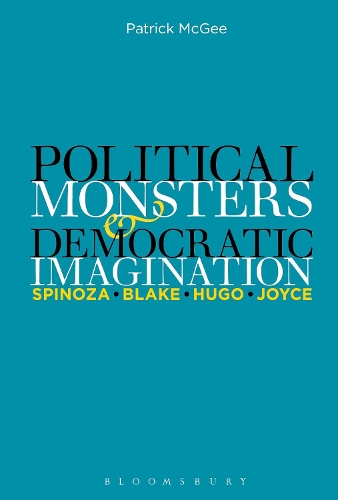
Political Monsters and Democratic Imagination: Spinoza, Blake, Hugo, Joyce
(Paperback)
Available Formats
Publishing Details
Political Monsters and Democratic Imagination: Spinoza, Blake, Hugo, Joyce
By (Author) Professor Patrick McGee
Bloomsbury Publishing PLC
Bloomsbury Academic USA
22nd March 2018
United States
Classifications
Tertiary Education
Non Fiction
Philosophy
809
Physical Properties
Paperback
280
Width 152mm, Height 229mm
381g
Description
Political Monsters and Democratic Imagination explores the democratic thought of Spinoza and its relation to the thought of William Blake, Victor Hugo, and James Joyce. As a group, these visionaries articulate: a concept of power founded not on strength or might but on social cooperation; a principle of equality based not on the identity of individuals with one another but on the difference between any individual and the intellectual power of society as a whole; an understanding of thought as a process that operates between rather than within individuals; and a theory of infinite truth, something individuals only partially glimpse from their particular cultural situations. For Blake, God is the constellation of individual human beings, whose collective imagination produces revolutionary change. In Hugos novel, Jean Valjean learns that the greatest truth about humanity lies in the sewer or among the lowest forms of social existence. For Joyce, Leopold and Molly Bloom are everybody and nobody, singular beings whose creative power and truth is beyond categories and social hierarchies.
Reviews
This is a wonderfully wide-ranging book, as the title suggests McGee [provides] astonishing perceptions about Blakes poem and his images. This is true of the Hugo and Joyce chapters, too. This book defies categories and would not seem to fit into a specific course of study, until you realize that it offers a course of study all its own. I would happily sit with a group of graduate students, or indeed advanced undergraduates, and work through these ideas. The results might very well be life-changing. * Studies in English Literature 1500-1900 *
Reading a really fine critical study should be a process of having your expectations dashed Patrick McGees Political Monsters displaced a number of my deeply-rooted beliefs, and the book is of such scope and intellectual power that it competes with the highest level of criticism An astonishing accomplishment. * James Joyce Literary Supplement *
'There is no such thing as a conservative thought.' Thus opens this brilliant, pathbreaking work, one of the very first to grasp the full significance of Spinozas democratic ontology for western literature. Spinoza has returned in force in recent years, as the rebel philosopher who inspired Deleuze, much post-Marxist critique, and, not least, the New Materialists and the most exciting of the new environmental criticism. Here Patrick McGee, who ever since his first book Paperspace has always proven himself an original thinker, ambitiously reads Spinoza through the lens of Negri and Badiou. He then offers brilliant new interpretations of visionary epics by Blake, Hugo and Joyce as Spinozists for whom thought, change and matter are almost one. McGee limns in a new way how these writers can champion democratic change. Clear, well-argued, profound: this is an exciting thought-experiment, a book to shift the debates on literatures power. * Enda Duffy, Professor of English, University of California Santa Barbara, USA *
An important contribution to literary studies, Political Monsters and Democratic Imagination asks a number of crucial questions: can literature help us undo centuries of thinking about the subject and the world in which the subject moves McGee engages the work of Baruch Spinoza and contemporary philosophers such as Antonio Negri and Alain Badiou in order to show how William Blake, Victor Hugo and James Joyce challenge the sovereignty of that subject and the regime of truth that supports it. By showing how these writers exemplify Spinozas ontology of immanence, which knits the individual to a world of ideas and thoughts beyond her, McGee reveals that they were already part of the transindividual singularity that we might call 'literature and theory.' * Gregory Castle, Professor of English, Arizona State University, USA *
Author Bio
Patrick McGee is Professor Emeritus of English at Louisiana State University, USA. He currently lives in Seattle, Washington, where he continues his research and writing. He is the author of eight books, including Cinema, Theory and Political Responsibility in Contemporary Culture (1997), Joyce beyond Marx: History and Desire in Ulysses and Finnegans Wake (2001), and Theory and the Common from Marx to Badiou (2009).
